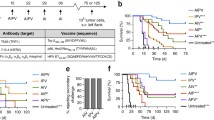Abstract
Cancer immunotherapies, including immune checkpoint blockage and adoptive transfer of CAR-T cells, have achieved historical successes for many kinds of malignancy. However, a minority of patients survive long term over 5 years without relapse, perhaps owing to tumor heterogeneity and potent immunosuppression in the tumor microenvironment. Here, using an established mouse tumor model of triple-negative 4T1 breast cancer, we show that local immunochemotherapy triggers powerful local and systemic antitumor immunity. Paraneoplastic injection of CpG, α-OX40, and anthracycline completely eliminated both local and distant large established 4T1 breast cancer without obvious relapse. Analysis of the immune cells at tumor tissues, draining lymph nodes, and spleens revealed that the local treatment increased the infiltration of CD4+ and CD8+ T cells in all three tissues and inhibited the accumulation of myeloid-derived suppressor cells in the spleen in a delayed response. Most importantly, this treatment triggered systemic T cell response against 4T1 tumors and some of their neoantigen epitopes as detected by IFN-γ ELISpot and intracellular cytokine assays in splenocytes. Furthermore, T cells showed specific cytotoxic activity against 4T1 tumor cells in vitro. In general, this local immunochemotherapy provides a new approach to target highly diverse neoantigens in various types of cancers without complicated and expensive antigen identification via next-generation sequencing.






Similar content being viewed by others
Data availability
Data are available upon reasonable request. All data relevant to the study are included in the paper or uploaded as supplementary material.
References
Bianchini G, Balko JM, Mayer IA, Sanders ME, Gianni L (2016) Triple-negative breast cancer: challenges and opportunities of a heterogeneous disease. Nat Rev Clin Oncol 13(11):674–690. https://doi.org/10.1038/nrclinonc.2016.66
Denkert C, Liedtke C, Tutt A, von Minckwitz G (2017) Molecular alterations in triple-negative breast cancer-the road to new treatment strategies. Lancet 389(10087):2430–2442. https://doi.org/10.1016/s0140-6736(16)32454-0
Wahba HA, El-Hadaad HA (2015) Current approaches in treatment of triple-negative breast cancer. Cancer Biol Med 12(2):106–116. https://doi.org/10.7497/j.issn.2095-3941.2015.0030
Sharma P (2016) Biology and management of patients with triple-negative breast cancer. Oncologist 21(9):1050–1062. https://doi.org/10.1634/theoncologist.2016-0067
Longley DB, Johnston PG (2005) Molecular mechanisms of drug resistance. J Pathol 205(2):275–292. https://doi.org/10.1002/path.1706
Gradishar WJ, Anderson BO, Balassanian R, Blair SL, Burstein HJ, Cyr A, Elias AD, Farrar WB, Forero A, Giordano SH, Goetz M, Goldstein LJ, Hudis CA, Isakoff SJ, Marcom PK, Mayer IA, McCormick B, Moran M, Patel SA, Pierce LJ, Reed EC, Salerno KE, Schwartzberg LS, Smith KL, Smith ML, Soliman H, Somlo G, Telli M, Ward JH, Shead DA, Kumar R (2015) Breast cancer, version 1.2016 featured updates to the NCCN guidelines. JNCCN J Natl Compr Cancer Netw 13(12):1475–1485. https://doi.org/10.6004/jnccn.2015.0176
Couzin-Frankel J (2013) Breakthrough of the year 2013. Cancer Immunother Sci 342(6165):1432–1433. https://doi.org/10.1126/science.342.6165.1432
Kaiser J, Couzin-Frankel J (2018) Cancer immunotherapy sweeps Nobel for medicine. Science 362(6410):13. https://doi.org/10.1126/science.362.6410.13
Karn T, Jiang T, Hatzis C, Sänger N, El-Balat A, Rody A, Holtrich U, Becker S, Bianchini G, Pusztai L (2017) Association between genomic metrics and immune infiltration in triple-negative breast cancer. JAMA Oncol 3(12):1707–1711. https://doi.org/10.1001/jamaoncol.2017.2140
Loi S, Sirtaine N, Piette F, Salgado R, Viale G, Van Eenoo F, Rouas G, Francis P, Crown JP, Hitre E, de Azambuja E, Quinaux E, Di Leo A, Michiels S, Piccart MJ, Sotiriou C (2013) Prognostic and predictive value of tumor-infiltrating lymphocytes in a phase III randomized adjuvant breast cancer trial in node-positive breast cancer comparing the addition of docetaxel to doxorubicin with doxorubicin-based chemotherapy: BIG 02-98. J Clin Oncol Off J Am Soc Clin Oncol 31(7):860–867. https://doi.org/10.1200/jco.2011.41.0902
Wimberly H, Brown JR, Schalper K, Haack H, Silver MR, Nixon C, Bossuyt V, Pusztai L, Lannin DR, Rimm DL (2015) PD-L1 expression correlates with tumor-infiltrating lymphocytes and response to neoadjuvant chemotherapy in breast cancer. Cancer Immunol Res 3(4):326–332. https://doi.org/10.1158/2326-6066.Cir-14-0133
Marra A, Viale G, Curigliano G (2019) Recent advances in triple negative breast cancer: the immunotherapy era. BMC Med 17(1):90. https://doi.org/10.1186/s12916-019-1326-5
Adams S, Schmid P, Rugo HS, Winer EP, Loirat D, Awada A, Cescon DW, Iwata H, Campone M, Nanda R, Hui R, Curigliano G, Toppmeyer D, O’Shaughnessy J, Loi S, Paluch-Shimon S, Tan AR, Card D, Zhao J, Karantza V, Cortés J (2019) Pembrolizumab monotherapy for previously treated metastatic triple-negative breast cancer: cohort A of the phase II KEYNOTE-086 study. Ann Oncol 30(3):397–404. https://doi.org/10.1093/annonc/mdy517
Schmid P, Adams S, Rugo HS, Schneeweiss A, Barrios CH, Iwata H, Diéras V, Hegg R, Im SA, Shaw Wright G, Henschel V, Molinero L, Chui SY, Funke R, Husain A, Winer EP, Loi S, Emens LA (2018) Atezolizumab and nab-paclitaxel in advanced triple-negative breast cancer. N Engl J Med 379(22):2108–2121. https://doi.org/10.1056/NEJMoa1809615
Friedman CF, Proverbs-Singh TA, Postow MA (2016) Treatment of the immune-related adverse effects of immune checkpoint inhibitors: a review. JAMA Oncol 2(10):1346–1353. https://doi.org/10.1001/jamaoncol.2016.1051
Mittendorf EA, Philips AV, Meric-Bernstam F, Qiao N, Wu Y, Harrington S, Su X, Wang Y, Gonzalez-Angulo AM, Akcakanat A, Chawla A, Curran M, Hwu P, Sharma P, Litton JK, Molldrem JJ, Alatrash G (2014) PD-L1 expression in triple-negative breast cancer. Cancer Immunol Res 2(4):361–370. https://doi.org/10.1158/2326-6066.Cir-13-0127
Kumar S, Wilkes DW, Samuel N, Blanco MA, Nayak A, Alicea-Torres K, Gluck C, Sinha S, Gabrilovich D, Chakrabarti R (2018) ΔNp63-driven recruitment of myeloid-derived suppressor cells promotes metastasis in triple-negative breast cancer. J Clin Invest 128(11):5095–5109. https://doi.org/10.1172/jci99673
Sagiv-Barfi I, Czerwinski DK, Levy S, Alam IS, Mayer AT, Gambhir SS, Levy R (2018) Eradication of spontaneous malignancy by local immunotherapy. Sci Transl Med. https://doi.org/10.1126/scitranslmed.aan4488
Khalil DN, Suek N, Campesato LF, Budhu S, Redmond D, Samstein RM, Krishna C, Panageas KS, Capanu M, Houghton S, Hirschhorn D, Zappasodi R, Giese R, Gasmi B, Schneider M, Gupta A, Harding JJ, Moral JA, Balachandran VP, Wolchok JD, Merghoub T (2019) In situ vaccination with defined factors overcomes T cell exhaustion in distant tumors. J Clin Investig 129(8):3435–3447. https://doi.org/10.1172/jci128562
Hammerich L, Marron TU, Upadhyay R, Svensson-Arvelund J, Dhainaut M, Hussein S, Zhan Y, Ostrowski D, Yellin M, Marsh H, Salazar AM, Rahman AH, Brown BD, Merad M, Brody JD (2019) Systemic clinical tumor regressions and potentiation of PD1 blockade with in situ vaccination. Nat Med 25(5):814–824. https://doi.org/10.1038/s41591-019-0410-x
Li W, Tanikawa T, Kryczek I, **a H, Li G, Wu K, Wei S, Zhao L, Vatan L, Wen B, Shu P, Sun D, Kleer C, Wicha M, Sabel M, Tao K, Wang G, Zou W (2018) Aerobic glycolysis controls myeloid-derived suppressor cells and tumor immunity via a specific CEBPB isoform in triple-negative breast cancer. Cell Metab 28(1):87-103.e106. https://doi.org/10.1016/j.cmet.2018.04.022
Lu J, Liu X, Liao YP, Salazar F, Sun B, Jiang W, Chang CH, Jiang J, Wang X, Wu AM, Meng H, Nel AE (2017) Nano-enabled pancreas cancer immunotherapy using immunogenic cell death and reversing immunosuppression. Nat Commun 8(1):1811. https://doi.org/10.1038/s41467-017-01651-9
Kreiter S, Vormehr M, van de Roemer N, Diken M, Lower M, Diekmann J, Boegel S, Schrors B, Vascotto F, Castle JC, Tadmor AD, Schoenberger SP, Huber C, Tureci O, Sahin U (2015) Mutant MHC class II epitopes drive therapeutic immune responses to cancer. Nature 520(7549):692–696. https://doi.org/10.1038/nature14426
Miconnet I, Koenig S, Speiser D, Krieg A, Guillaume P, Cerottini JC, Romero P (2002) CpG are efficient adjuvants for specific CTL induction against tumor antigen-derived peptide. J Immunol 168(3):1212–1218. https://doi.org/10.4049/jimmunol.168.3.1212
Li LP, Lampert JC, Chen X, Leitao C, Popović J, Müller W, Blankenstein T (2010) Transgenic mice with a diverse human T cell antigen receptor repertoire. Nat Med 16(9):1029–1034. https://doi.org/10.1038/nm.2197
Shirota H, Tross D, Klinman DM (2015) CpG oligonucleotides as cancer vaccine adjuvants. Vaccines (Basel) 3(2):390–407. https://doi.org/10.3390/vaccines3020390
Wang S, Campos J, Gallotta M, Gong M, Crain C, Naik E, Coffman RL, Guiducci C (2016) Intratumoral injection of a CpG oligonucleotide reverts resistance to PD-1 blockade by expanding multifunctional CD8+ T cells. Proc Natl Acad Sci 113(46):E7240-e7249. https://doi.org/10.1073/pnas.1608555113
Poropatich K, Dominguez D, Chan WC, Andrade J, Zha Y, Wray B, Miska J, Qin L, Cole L, Coates S, Patel U, Samant S, Zhang B (2020) OX40+ plasmacytoid dendritic cells in the tumor microenvironment promote antitumor immunity. J Clin Investig 130(7):3528–3542. https://doi.org/10.1172/jci131992
Obeid M, Tesniere A, Ghiringhelli F, Fimia GM, Apetoh L, Perfettini JL, Castedo M, Mignot G, Panaretakis T, Casares N, Metivier D, Larochette N, van Endert P, Ciccosanti F, Piacentini M, Zitvogel L, Kroemer G (2007) Calreticulin exposure dictates the immunogenicity of cancer cell death. Nat Med 13(1):54–61. https://doi.org/10.1038/nm1523
Casares N, Pequignot MO, Tesniere A, Ghiringhelli F, Roux S, Chaput N, Schmitt E, Hamai A, Hervas-Stubbs S, Obeid M, Coutant F, Metivier D, Pichard E, Aucouturier P, Pierron G, Garrido C, Zitvogel L, Kroemer G (2005) Caspase-dependent immunogenicity of doxorubicin-induced tumor cell death. J Exp Med 202(12):1691–1701. https://doi.org/10.1084/jem.20050915
Chen L, Zhou L, Wang C, Han Y, Lu Y, Liu J, Hu X, Yao T, Lin Y, Liang S, Shi S, Dong C (2019) Tumor-targeted drug and CpG delivery system for phototherapy and docetaxel-enhanced immunotherapy with polarization toward M1-type macrophages on triple negative breast cancers. Adv Mater 31(52):e1904997. https://doi.org/10.1002/adma.201904997
Zoglmeier C, Bauer H, Noerenberg D, Wedekind G, Bittner P, Sandholzer N, Rapp M, Anz D, Endres S, Bourquin C (2011) CpG blocks immunosuppression by myeloid-derived suppressor cells in tumor-bearing mice. Clin Cancer Res 17(7):1765–1775. https://doi.org/10.1158/1078-0432.CCR-10-2672
Shirota Y, Shirota H, Klinman DM (2012) Intratumoral injection of CpG oligonucleotides induces the differentiation and reduces the immunosuppressive activity of myeloid-derived suppressor cells. J Immunol 188(4):1592–1599. https://doi.org/10.4049/jimmunol.1101304
Kumar V, Patel S, Tcyganov E, Gabrilovich DI (2016) The nature of myeloid-derived suppressor cells in the tumor microenvironment. Trends Immunol 37(3):208–220. https://doi.org/10.1016/j.it.2016.01.004
Mao Y, Sarhan D, Steven A, Seliger B, Kiessling R, Lundqvist A (2014) Inhibition of tumor-derived prostaglandin-e2 blocks the induction of myeloid-derived suppressor cells and recovers natural killer cell activity. Clin Cancer Res 20(15):4096–4106. https://doi.org/10.1158/1078-0432.Ccr-14-0635
Pan PY, Ma G, Weber KJ, Ozao-Choy J, Wang G, Yin B, Divino CM, Chen SH (2010) Immune stimulatory receptor CD40 is required for T-cell suppression and T regulatory cell activation mediated by myeloid-derived suppressor cells in cancer. Cancer Res 70(1):99–108. https://doi.org/10.1158/0008-5472.Can-09-1882
DuPage M, Mazumdar C, Schmidt LM, Cheung AF, Jacks T (2012) Expression of tumour-specific antigens underlies cancer immunoediting. Nature 482(7385):405–409. https://doi.org/10.1038/nature10803
Tran E, Robbins PF, Rosenberg SA (2017) “Final common pathway” of human cancer immunotherapy: targeting random somatic mutations. Nat Immunol 18(3):255–262. https://doi.org/10.1038/ni.3682
Zacharakis N, Chinnasamy H, Black M, Xu H, Lu YC, Zheng Z, Pasetto A, Langhan M, Shelton T, Prickett T, Gartner J, Jia L, Trebska-McGowan K, Somerville RP, Robbins PF, Rosenberg SA, Goff SL, Feldman SA (2018) Immune recognition of somatic mutations leading to complete durable regression in metastatic breast cancer. Nat Med 24(6):724–730. https://doi.org/10.1038/s41591-018-0040-8
Acknowledgements
We thank Professor Wende Li of Guangzhou Institute of Zoology for gifting us the 4T1 breast cancer cell line. We thank Qing Liu for technical guidance in flow cytometry. We also thank Charlesworth for polishing our manuscript.
Funding
This project was supported by National Key Research and Development Projects (2016YFC1303404 and 2016YFA0101103) of the Ministry of Science and Technology, project (81472824) of National Natural Science Foundation, and Guangdong Science and Technology Project (2015A020211009) from the Guangdong Science and Technology Innovation Commission, of the People's Republic of China.
Author information
Contributions
JG and XY performed the experiments and wrote the manuscript. LL designed, proposed, and supervised this project and wrote the manuscript. All authors approved the final version of the manuscript.
Corresponding author
Ethics declarations
Conflict of interest
All authors declare no financial conflicts or competing interest.
Ethical approval
All animal studies were approved by **an University Experimental Animal Center and by the Ethics Committee of **an University (Approval number: IACUC-20190916-07).
Additional information
Publisher's Note
Springer Nature remains neutral with regard to jurisdictional claims in published maps and institutional affiliations.
Supplementary Information
Below is the link to the electronic supplementary material.
Rights and permissions
About this article
Cite this article
Gao, J., Yuan, X., Yuan, J. et al. Complete rejection of large established breast cancer by local immunochemotherapy with T cell activation against neoantigens. Cancer Immunol Immunother 70, 3291–3302 (2021). https://doi.org/10.1007/s00262-021-02919-2
Received:
Accepted:
Published:
Issue Date:
DOI: https://doi.org/10.1007/s00262-021-02919-2




